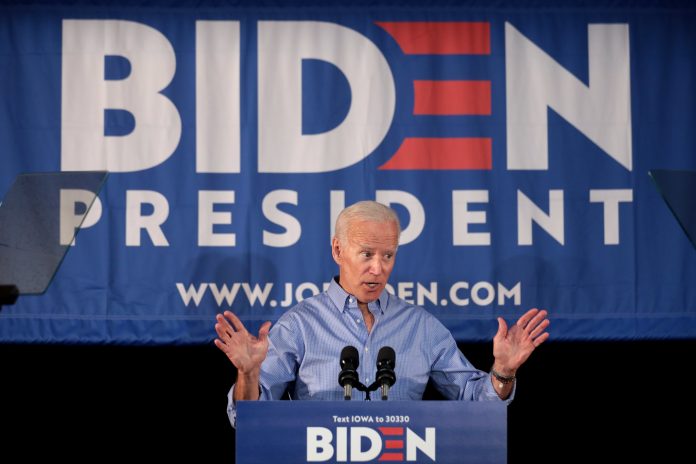The coalition that is forming around Joe Biden’s candidacy is very unusual because in the last few months it has become something bigger than the standard center-left Democratic Party coalition. Republicans who are now supporting Biden, like the operatives behind the Lincoln Project as well as former Ohio Governor John Kasich and former Congresswoman Susan Molinari, have been prominent people in the party with solid conservative credentials. These people, and many Republican voters, are moving to Biden not because they are thrilled with the influence of the left wing of the Democratic Party or because of the force of Biden’s personality-although most evince a respect for his decency and patriotism. Rather, they see Biden’s election as the key to restoring American democracy.
The support from these conservatives have raised some concern from the progressive wing of the party, but the gravity of the coming election has held the coalition together. The visual reinforcement of this was clear on the first night of the Democratic Convention when moments after Kasich spoke, the video moved to Vermont where Bernie Sanders, America’s most prominent social democrat, addressed the convention. While Kasich and Sanders, and the millions of voters who share the views of one of these two men, disagree on foreign policy, the marginal tax rate, abortion rights, health care policies and many other policies, they both agree that American democracy is worth preserving and that leads them, and millions of other Americans, to support Biden.
If Biden becomes president next January it will represent more than just a big electoral win, but also a significant democratic breakthrough for the US. However, for that breakthrough to be enduring and meaningful, Biden’s victory must be the beginning, not the culmination, of this process
Despite ample public opinion data suggesting that Biden is leading now, a lot needs to happen over the next five months for Biden to become president next January. First, Biden must hold his lead in the polls over for another two and a half months and win the election. That is probably the least daunting of the tasks facing Biden and his party. Second, the American people must be able to vote on November 3rd and in the weeks leading up to the election. The pandemic, and Trump’s efforts to undermine the US Postal Service, at a time when it is a crucial link the voting process, create barriers for many Americans to vote while simultaneously sowing doubt among Trump’s followers regarding the legitimacy of the election. Third, the same movement that is helping Biden to his lead in the polls and who, if they are able to vote, will elect him, must make sure that Donald Trump leaves office after losing the election. Taken together, these are enormous, but not insurmountable challenges.
If, despite these challenges, Biden becomes president next January it will represent more than just a big electoral win, but also a significant democratic breakthrough for the US. However, for that breakthrough to be enduring and meaningful, Biden’s victory must be the beginning, not the culmination, of this process.
There have been a few times in American history when democracy has been meaningfully expanded. The years immediately following the Civil War, although those advances were unfortunately reversed a few years later, women winning the franchise a century ago and the Civil Rights Movement in the 1960s are all examples of this. It is time for another period of democratic advance in the US. The specific reforms that need to be made are clear. First, voting rights must be enshrined in federal law. President Barack Obama has called for a new voting rights act to be named after the late John Lewis, a true American hero who fought tirelessly for equality and civil rights. It must no longer be possible to states to create barriers for some people to vote or for a political party to be able to use access to the franchise as a campaign tool.
The last few years have revealed that it is no longer possible to ignore or shrug off the extent to which core institutions of our political system like the electoral college and the US senate pervert the fundamental democratic notion of one person one vote
This kind of voting rights reform would immediately make America more democratic, but it will not be enough. The next round of reforms will be even tougher because, unlike solidifying voter rights, they require addressing the bedrock undemocratic quirks of the American Constitution. The last few years have revealed that it is no longer possible to ignore or shrug off the extent to which core institutions of our political system like the electoral college and the US senate pervert the fundamental democratic notion of one person one vote.
The tension between the Constitution and principles of democracy have been around for a long time, but the same demographic and political trends that made the Trump presidency possible, have made this conflict more damaging than in recent years. Today, three of the four bodies that govern America are controlled by a party that has not won the plurality of votes in a national presidential election since 2004-and only twice since 1988. Donald Trump’s presidency, the Republican majority on the senate and the conservative majority on the Supreme Court are, therefore, not the products of majorities or truly democratic processes, but of a minority of voters who happen to live in the right states.
As long as the foundation of our government is structured in this way, democracy will be constrained not by the caution of checks and balances, but by the undemocratic idea of weighing some voters more than others. Unless this breakthrough takes that on as well, our democracy will always be incomplete.
www.lincolnmitchell.com
Follow me on Twitter at http://twitter.com/LincolnMitchell

